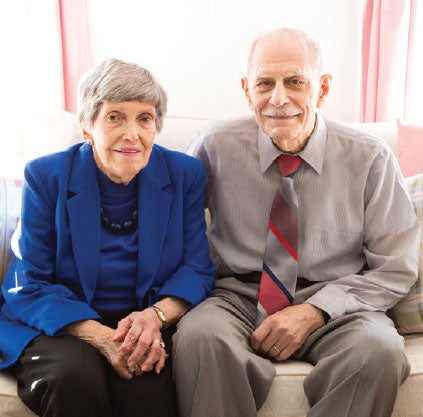Eugene and Rose Gangarosa believe in getting a head start. They know how important it is to begin early. They’ve seen how much can be accomplished when you have a strong lead. It is, they say, amazing how far you can go when you start from the beginning.
For the Gangarosas, it all started in Rochester, N.Y., where they grew up across the street from each other. From the very beginning, the two first-generation American children were familiar parts of one another’s lives. Still, Rose, the daughter of an Italian barbershop owner, didn’t know quite the same poverty that Eugene experienced. The son of a Sicilian stonecutter who was in and out of work, Eugene is the 12th of 13 children – only five of whom survived because they had to ration water.
That’s where it all started: the driving force for the Gangarosas’ lifelong efforts championing public health and safe water initiatives.
After marrying his childhood sweetheart, Eugene served at the Walter Reed Army Institute of Research, where he laid the foundation for the cholera treatment that drastically reduced infant mortality. He went on to teach and research at the Pakistan Medical Research Center and then served as the Centers for Disease Control’s director of the Epidemic Intelligence Service, chief of the Enteric Diseases Branch and deputy director of the Bacterial Diseases Division. After a stint as the dean of the American University of Beirut, Eugene began teaching at Emory University, where he helped transform the public health graduate program into the Rollins School of Public Health.
Now an emeritus professor in the Hubert Department of Global Health at Rollins, Eugene is considered a public health legend – and both he and Rose are globally recognized as historic pioneers in the field. Together the two founded the Gangarosa International Health Foundation, which for years has funded global field experiences for Rollins students – and, starting last year, for students in the public health program at the College of Charleston as well.

From left to right: Paul Gangarosa with students Megan Dunham and Alexis Parrott at the BOUNDLESS launch event in fall 2014
It all started with the Gangarosas’ son, Paul, a faculty member in the College’s Department of Health and Human Performance, who suggested the idea to his father.
“Paul started the ball rolling, and whenever Paul gets excited, we get fired up, too,” laughs Eugene, who visited the College to speak to Paul’s public health students. “The students I met that day were exceptional. The level of enthusiasm they had was infectious, and the interaction I had with them was impressive. They were of the same caliber as the students at the Rollins School.”
Thus began the Safe Water International Internship at the College, which has so far funded a trip to Haiti for two students, including public health major Maclain Borsich.
“This experience was the perfect example of global health in action,” says Borsich, who hopes to continue studying public health at the Rollins School.
“Having this opportunity for our students is simply wonderful,” says Fran Welch, dean of the School of Education, Health, and Human Performance, noting that the Rollins School has been a great resource for the College’s new program, which was established in 2012. “We’re most thankful for the Gangarosa family and its contributions to the program, the College and the world.”
Noting that the College’s public health program “is equally impressive as the Rollins program when it was first beginning,” Eugene believes that global field studies are essential to improving not just students’ learning, but the world’s health, too. After all, it was the Gangarosas’ own field experiences that inspired their lifelong dedication to safe water.
For Rose, it started with the canal in Pakistan that she had to cross to get to the Lahore American School, where she taught high school English and served as principal: “It was the most polluted water I’d ever seen. And they used this water for everything: baths, laundry, brushing their teeth, drinking. The animals were in it. That just really, really impressed me a good bit. I came home one day and said, ‘I wish there was something I could do. Everybody should have safe water.’ Water is the most important thing in life. You can’t live without it. My hope is that no one has to see the pollution I saw in that canal in Pakistan.”
“Rose and I both had experiences that led us to believe that everyone should have the right to safe water,” says Eugene. “We hope for equality in health all over the world. And water is the starting point.”
“From there, it all falls into place,” agrees Rose, citing that educating women in developing countries about water and sanitation has also been crucial, because women provide the water in the homes and are teaching their children. “These women are now educated and passing the torch. I’m glad to have had a part
in that.”
“We’ve saved the lives of a lot of people whose faces we will never see, but we’re equally proud of the people who have continued to save lives through education. We have watched them bloom and become leaders, and that multiplying effect is the best investment we could possibly make,” says Eugene. “They are carrying the torch from generation to generation.”
It just shows how far you can go when you get off to a good start.




